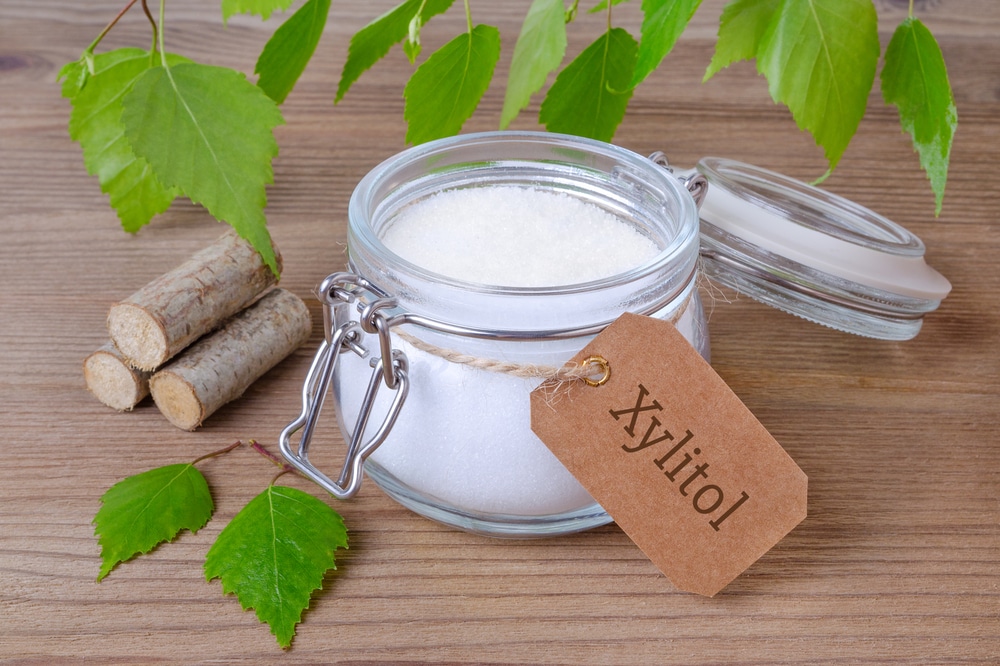You may not know what xylitol is, but if you consume sugarless products, you have probably already eaten it. This natural sweetener is used as a sugar substitute in lots of products. But since we have four-legged friends that love to beg for anything that is in our hands and sometimes steal things they are not supposed to, it is important to know: is xylitol safe for dogs?
Xylitol is extremely toxic for dogs, and they should never be allowed to consume it. It can cause serious symptoms such as tremors, seizures, and coma, and it can even progress to death. Be really aware of the composition of the sugarless products you have at home, and if you suspect your dog has ingested xylitol, call your vet straight away.
Table of Contents
What Is Xylitol?

Xylitol is a natural sweetener frequently used in sugarless products. It is categorized as a sugar alcohol, which means it is a compound that naturally occurs in some fruits and vegetables and is commonly used to replace sugar due to its sweet taste.
There are many fruits and vegetables xylitol occurs naturally in, including strawberries, mushrooms, pumpkins, and corncobs. Also, this natural sweetener can be found in straw and some cereals. The sweetening power of xylitol is the same as sugar, but it has approximately 40% fewer calories, so it has been widely used by people trying to reduce sugar ingestion and diabetics.
Where Can I Find Xylitol?
Different kinds of industries commonly use xylitol in their products, such as the oral-care, food, and pharmaceutical industries. This natural sweetener can be mostly found in:
- Chewing gums
- Toothpastes
- Mouthwashes
- Hard sucking candies
- Cough syrups
- Chocolates
- Ice creams
- Some supplements
- Jams
- Nut butters
Is Xylitol Safe For Dogs?
Although most natural sweeteners are safe for dogs in moderation (although we still recommend not giving any to them), xylitol is an exception. Since dogs’ organism absorbs this sweetener very quickly and starts a chain of mechanisms (starting with the pancreas releasing a lot of insulin, which causes low blood sugar in your friend) that can be really harmful, xylitol ingestion is so dangerous that it can even cause death. Even small amounts can cause discomfort, and high amounts can easily be lethal, so xylitol is not considered safe for dogs.
Is There A Safe Amount?
Since there is a wide variety of sizes and weights of dogs, it is hard to specify how much xylitol is too much. Besides, different dogs may have different levels of gastrointestinal sensibility, so xylitol can act quicker and deeper in some dogs than others. Even small quantities can cause discomfort like vomiting and diarrhea. Because of that, we can’t establish a safe amount. In general, the best thing to do is to avoid the ingestion of any amount of xylitol.
What Symptoms Can Xylitol Cause?
Once dogs ingest xylitol, they quickly absorb the substance into the blood. Their pancreas starts to produce and release a lot of insulin in the body. This insulin will move glucose from the blood to the inside of the cells, resulting in low glucose levels in the blood (hypoglycemia). Low blood sugar, along with the effect that a new substance can cause in the stomach and intestines, results in the main signs and symptoms that xylitol can cause, such as:
- Vomiting
- Diarrhea
- Incoordination
- Weakness
- Lethargy
- Tremors
- Seizures
- Coma
The progression of xylitol poisoning can cause liver failure and can evolve to death. It is a really serious condition that must be assisted as soon as possible, so if you notice any of these symptoms, call your local vet immediately.
What Should I Do If My Dog Eats Xylitol?
If you catch your dog ingesting anything with xylitol or if you notice any symptoms described above, call your local vet immediately. Sometimes, if the amount is too small and your dog is not sensitive, the only thing that will happen is some vomiting and diarrhea. But since it’s not possible to predict exactly how the condition is going to progress, and it can evolve to a really bad outcome, the best thing to do is to seek professional help immediately.
Remember to not induce vomiting by yourself in any circumstance if you see your dog ingesting something with xylitol. Also, do not medicate your dog without the help of a certified veterinarian.
To avoid xylitol poisoning in your dog, make sure to always check the composition of the products you buy and keep all these items well stored. Your furry friend will be really thankful for that.
Conclusion: Is Xylitol Safe For Dogs?
Xylitol is not safe for dogs at all. When ingested, the substance is quickly absorbed by them and causes a lot of symptoms that can even progress to death. So, always be careful with the composition of the products you bring home, and make sure you keep them away from your pets.
What about you? How do you keep xylitol products away from your dog or how do you plan to? Let us know in the comments below!
